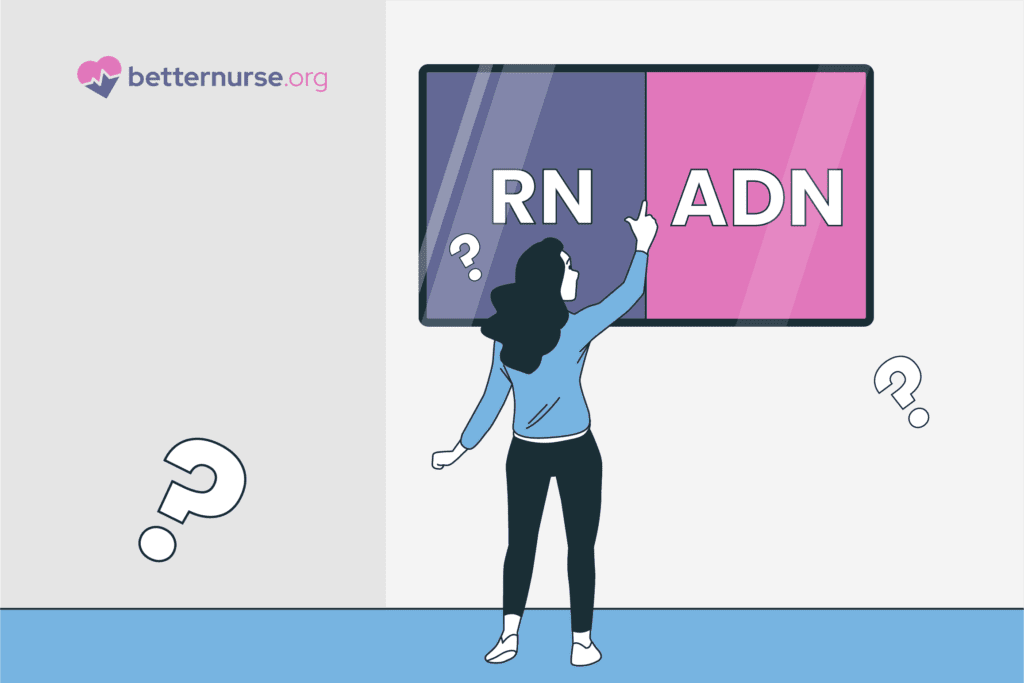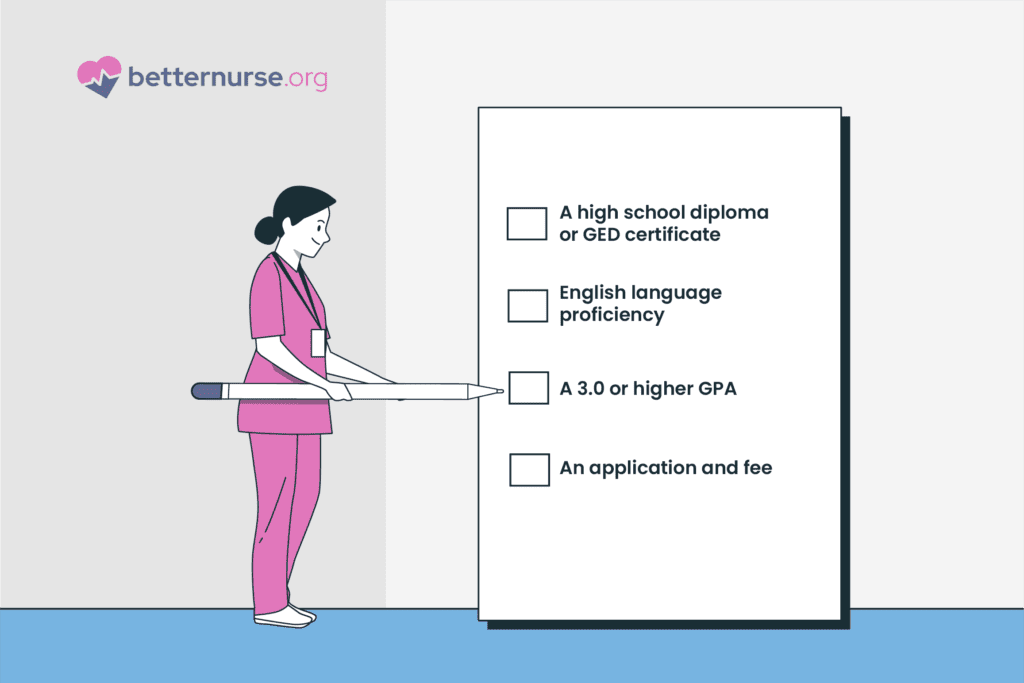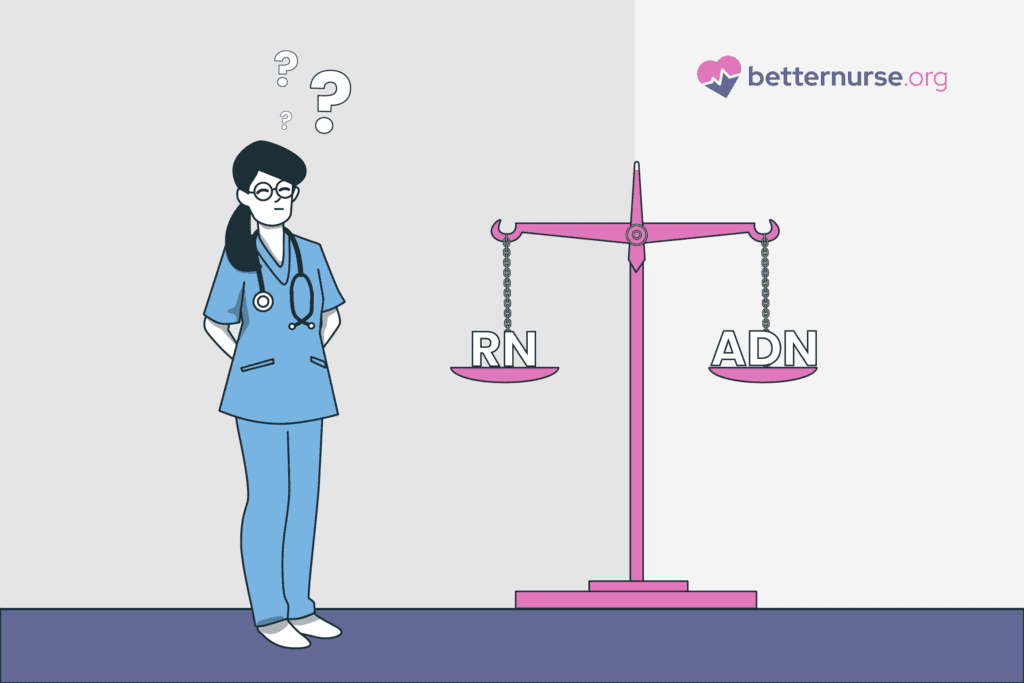Both registered nursing (RN) and an Associate Degree in Nursing (ADN) are education paths that equip people with the skills and knowledge needed to work in the nursing field. The key distinction between the two is the level of education and training needed.
Understanding RN vs. ADN
Choosing a career path in nursing is a highly important decision that requires careful consideration of various factors, including education, career goals, and personal interests. One of the most significant choices aspiring nurses must make is deciding between a registered nurse (RN) and an associate degree in nursing (ADN) program. Both paths lead to a career in nursing; however, they differ in terms of education requirements, the scope of practice, and job opportunities. In this article, we will explore the differences between RN vs. ADN programs to help you decide which path is right for you.
Takeaway
Deciding between RN and ADN can be compared to choosing between taking a direct flight and a connecting flight to reach your destination. A direct flight (RN) takes you straight to your destination, with fewer stops along the way, but it may require a higher investment of time and resources upfront. On the other hand, a connecting flight (ADN) involves more stops and may take longer to reach your destination, but it requires a lower upfront investment.

What Is an ADN?
ADN stands for Associate Degree in Nursing. It is a two-year undergraduate degree program offered by many community colleges and vocational schools. The program provides students with the fundamental knowledge and skills to become a registered nurse (RN) and start working in healthcare settings.
The curriculum focuses on developing skills in patient care, communication, critical thinking, and decision-making. Upon completing an ADN program, graduates are eligible to take the National Council Licensure Examination for Registered Nurses (NCLEX-RN) to become licensed RNs.
While ADN programs provide a solid foundation for a career in nursing, they may have limitations regarding career advancement and job opportunities.
What Is an RN Diploma?
An RN diploma is a nursing program that provides students with the necessary training and education to become registered nurses (RN). They are typically offered by hospital-based nursing schools or through vocational schools and take around two to three years to complete.
These programs offer a combination of classroom instruction and hands-on clinical experience, focusing on enhancing skills in patient care, communication, and critical thinking.
However, it’s important to note that RN diplomas are less common nowadays, and most nursing programs offered by colleges and universities are Associate Degree in Nursing (ADN) or Bachelor of Science in Nursing (BSN) programs.
What Is a BSN?
Bachelor of Science in Nursing is a four-year undergraduate degree program that provides students with a more advanced and in-depth education than an Associate Degree in Nursing (ADN) or an RN Diploma programs.
The curriculum of a BSN program includes general education courses as well as nursing-specific courses. It covers anatomy and physiology, pathophysiology, pharmacology, nursing ethics, health assessment, nursing research, community health nursing, and leadership in nursing.
Healthcare employers often prefer BSN graduates, as they have a more advanced education that allows them to take on leadership roles in healthcare settings, pursue specialized nursing careers, and continue their education at the graduate level.
ADN vs. RN vs. BSN: Admissions requirements

The admissions requirements for ADN, RN, and BSN programs can vary depending on the institution and program. Generally, all three programs require a high school diploma or equivalent, as well as prerequisite coursework.
ADN programs typically have less stringent admissions requirements than RN or BSN programs. Most ADN programs require:
- A high school diploma or GED certificate
- English language proficiency
- Math and science high school courses
- A 3.0 or higher GPA
- An application and fee
RN programs generally require applicants to:
- Hold a high school diploma or GED certificate
- Have English language proficiency
- Complete math and science high school courses
- Complete college prerequisite courses
- Have a 2.0-3.0 or higher GPA
- Submit an application and fee
On the other hand, BSN programs tend to have the most rigorous admissions requirements, such as:
- A high school diploma or GED certificate
- A GPA of 3.0 or higher, with courses in math and science
- Recommendations from teachers or employers
- An application and fee
Benefits of an RN – ADN
An RN – ADN program can provide students with an affordable, flexible, and efficient pathway to a career in nursing, with the opportunity for further education and career advancement in the future.
Affordability
One of the primary advantages is affordability. Compared to a four-year Bachelor of Science in Nursing (BSN) program, an RN – ADN program is usually more affordable, making it a great option for students on a budget. This can help students reduce their overall student loan debt and start earning a salary as a registered nurse sooner.
Length of time to complete
Another benefit of an RN – ADN program is the time it takes to complete. Most programs can be completed in two years, which means that students can enter the workforce and start earning a salary sooner. This can be especially attractive to students looking to begin their nursing career quickly or have other commitments, such as family or work, that make it difficult to commit to a more extended program.
Flexibility
RN – ADN programs also offer flexibility, as many programs are offered part-time or online. This makes it easier for students to balance their education with work and other personal responsibilities. Online programs, in particular, can allow students to study from home or work and complete coursework at their own pace, making it easier to fit education into their busy lives.
Step to getting a BSN
An RN – ADN program will pave the way to obtaining a BSN. Many RN – ADN programs offer a pathway to a BSN, allowing students to complete their BSN degree while working as RNs. This can open up more job opportunities and higher earning potential in your nursing career.
In addition, RN – ADN graduates can also take advantage of tuition reimbursement programs offered by many healthcare employers to help them continue their education and earn a BSN.
Benefits of an RN – BSN
An RN – BSN program provides registered nurses with several benefits, such as increased salary potential, advanced knowledge, enhanced career prospects, and a pathway to further advanced education. If you aspire to progress in your nursing career and contribute more significantly to the healthcare field, pursuing a BSN degree can prove beneficial.
Higher salary potential

Having a Bachelor of Science in Nursing provides registered nurses with a more advanced level of knowledge and skills that can lead to a higher salary potential. The enhanced education and skill set that comes with a BSN degree enables nurses to take on more advanced roles in healthcare, which typically have higher salaries. In addition, many healthcare employers recognize the value of BSN-prepared nurses and offer higher salaries to attract and retain these qualified professionals.
More knowledge
The RN – BSN program provides registered nurses with a more advanced education going beyond the fundamental nursing knowledge gained through an associate degree program. Nurses with a BSN degree are better equipped to handle complex patient care situations, communicate effectively with other healthcare professionals, and make well-informed decisions that impact patient outcomes. By completing a BSN degree, nurses gain a deeper understanding of the nursing profession and are equipped with advanced knowledge and skills that can help them become leaders in healthcare.
More career opportunities
Through RN – BSN programs, you will also have more career opportunities since many healthcare employers prefer to hire nurses with a BSN degree, particularly for leadership and management positions. In addition, nurses with a BSN degree are eligible to pursue a broader range of nursing specialties and certifications, which can lead to higher-paying and more fulfilling careers.
Step to go for a graduate program
A BSN degree is considered a critical requirement for advancing one’s nursing career and pursuing graduate-level education in nursing. Many graduate nursing programs require applicants to hold a BSN degree as a prerequisite for admission. Pursuing a BSN degree can open doors to a wide range of advanced education and career opportunities, including but not limited to nurse practitioner, nurse educator, nurse researcher, and nurse manager.
RN – ADN vs. RN – BSN: Which Is Right for You?

Deciding between an RN – ADN and an RN – BSN program can be a difficult choice for you as an aspiring registered nurse. Both programs have their own set of advantages and disadvantages, and ultimately, the decision depends on your individual career goals, financial situation, and personal preferences. That’s why it is important to carefully weigh the advantages and disadvantages of each program before making your decision.
Conclusion
In conclusion, choosing between RN and ADN programs needs careful consideration of various factors, including affordability, length of time to complete, flexibility, and career goals. By carefully considering the advantages and disadvantages of each program, you will be able to make a decision that aligns with your goals and sets a path toward a fulfilling career in nursing.

Nurse Luke is a CRNA who specializes in Nursing content and still enjoys a very busy career with Locum, Per Diem and Travel nursing in the greater midwest. He has over 25 years of experience in the healthcare field and received his CRNA masters degree from the Mayo Clinic School of Healthcare. He is passionate about helping nurses explore the options of becoming a travel nurse as well as spending time with his Family.



